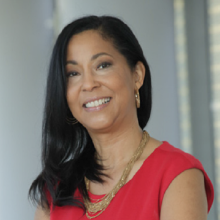Dr. Janine Austin Clayton, M.D., Associate Director for Research on Women’s Health and Director of the Office of Research on Women’s Health (ORWH) at the National Institutes of Health (NIH), is the architect of the NIH policy requiring scientists to consider sex as a biological variable across the research spectrum. This policy is part of NIH’s initiative to enhance reproducibility through rigor and transparency. As co-chair of the NIH Working Group on Women in Biomedical Careers with the NIH Director, Dr. Clayton also leads NIH’s efforts to advance women in science careers. In 2021, Dr. Clayton was elected to the Board of Directors of the American Association for the Advancement of Science (AAAS).
Prior to joining the ORWH, Dr. Clayton was the Deputy Clinical Director of the National Eye Institute (NEI) for seven years. A board-certified ophthalmologist, Dr. Clayton’s research interests include autoimmune ocular diseases and the role of sex and gender in health and disease. She is the author of more than 120 scientific publications, journal articles, and book chapters. Dr. Clayton, a native Washingtonian, received her undergraduate degree with honors from Johns Hopkins University and her medical degree from Howard University College of Medicine. She completed a residency in ophthalmology at the Medical College of Virginia. Dr. Clayton completed fellowship training in cornea and external disease at the Wilmer Eye Institute at Johns Hopkins Hospital and in uveitis and ocular immunology at NEI.
Dr. Clayton has received numerous awards, including the Senior Achievement Award from the Board of Trustees of the American Academy of Ophthalmology in 2008 and the European Uveitis Patient Interest Association Clinical Uveitis Research Award in 2010. She was selected as a 2010 Silver Fellow by the Association for Research in Vision and Ophthalmology. In 2015, she was awarded the American Medical Women’s Association Lila A. Wallis Women’s Health Award and the Wenger Award for Excellence in Public Service. Dr. Clayton was granted the Bernadine Healy Award for Visionary Leadership in Women’s Health in 2016. She was also selected as an honoree for the Woman’s Day Red Dress Awards and the American Medical Association’s Dr. Nathan Davis Awards for Outstanding Government Service in 2017.




